Key takeaways:
- Youth mentorship fosters self-confidence and vital life skills, creating a positive ripple effect in communities.
- Key mentoring skills include active listening, empathy, and adaptability, essential for building trust and effective relationships.
- Successful mentorship programs align the goals of mentors and mentees, incorporating structured feedback for continuous improvement.
- Measuring mentorship success involves observing the emotional growth and confidence of mentees, emphasizing personal, rather than quantitative, achievements.
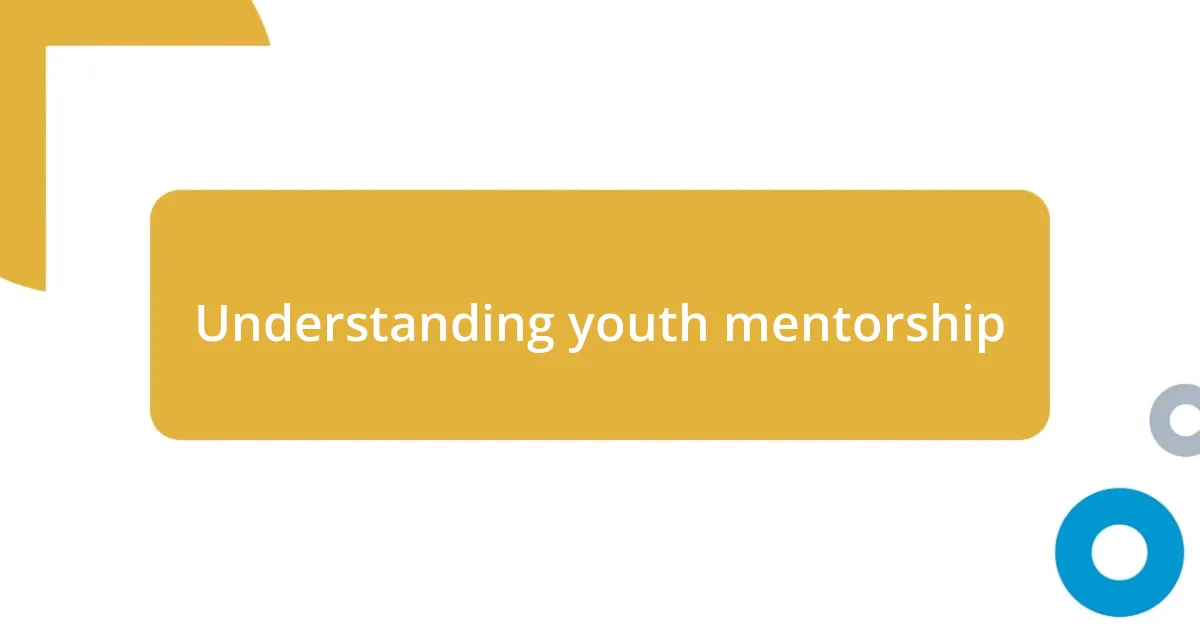
Understanding youth mentorship
Youth mentorship is a profound relationship where an adult guides and supports a young person through the complexities of growing up. I remember my first mentee, a bright teenager grappling with self-doubt. Seeing her transform into a confident individual was a turning point for me—the power of connection and encouragement is truly remarkable.
At its core, mentorship is about more than just sharing knowledge; it’s about building trust and understanding. Have you ever felt unsure about your future? A mentor can be that steady voice of reason, offering perspective during turbulent times. I often found that simply listening to my mentee’s concerns helped create a safe space for her to explore her dreams and fears.
The impact of youth mentorship extends far beyond the mentee. I can’t tell you how fulfilling it is to watch these young individuals grow and succeed. It’s a two-way street; while I guided and inspired my mentees, they taught me resilience and fresh ways to see the world. Isn’t it fascinating that in mentoring, both parties experience growth together?
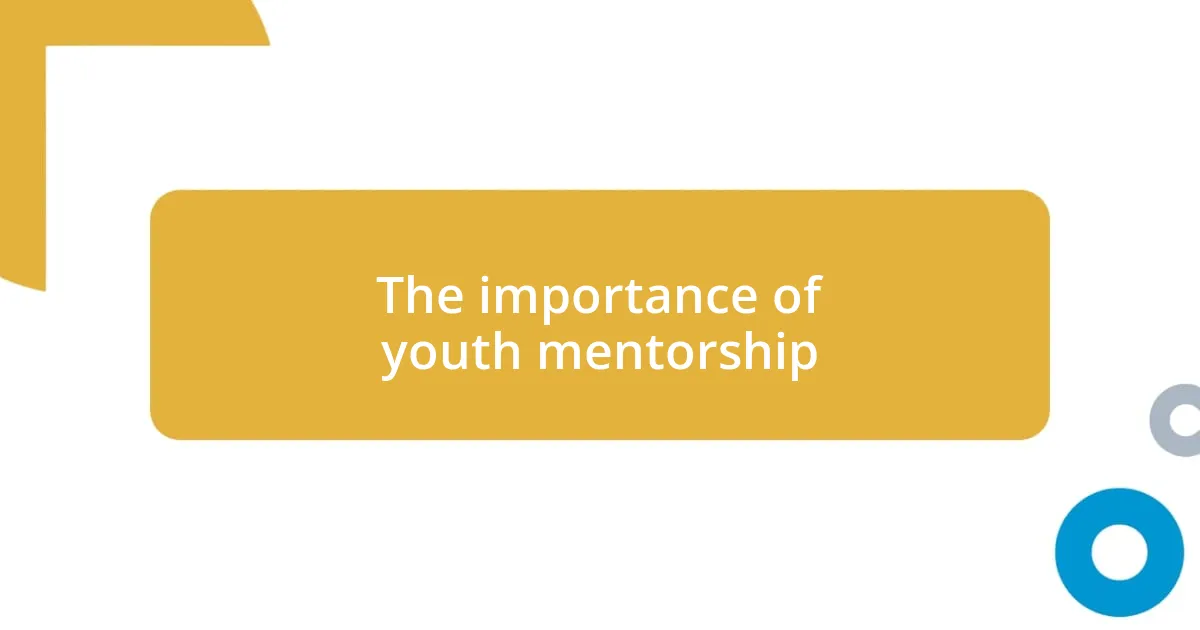
The importance of youth mentorship
Youth mentorship plays a vital role in shaping the future of young individuals. I recall a time when I guided a young boy through his struggles with anxiety. Watching him transform from a hesitant participant in group activities to a confident leader in his school made me realize how mentorship can instill self-belief and resilience. It’s like planting a seed—nurturing it over time leads to beautiful growth.
Moreover, mentorship fosters essential life skills that extend beyond academics. I often emphasize the importance of communication and teamwork in my sessions. One of my mentees learned to collaborate effectively during a school project, which not only improved their grades but also enhanced their social skills. It’s profound to see how these experiences shape a young person’s ability to navigate life’s challenges.
Finally, the ripple effect of mentorship is truly significant. I once had a mentee who, after gaining self-confidence, started volunteering to mentor others. This cycle of giving back is powerful; it not only empowers the mentee but also enriches the community. Have you experienced a mentorship relationship that impacted you? I believe these connections create a legacy of growth and encouragement that lasts for generations.
| Benefits of Youth Mentorship | Examples from My Experience |
|---|---|
| Self-Confidence Boost | Witnessing a hesitant mentee grow into a confident leader. |
| Life Skills Development | Helping a mentee improve communication skills during collaborative projects. |
| Community Impact | A mentee began mentoring others, creating a positive ripple effect. |
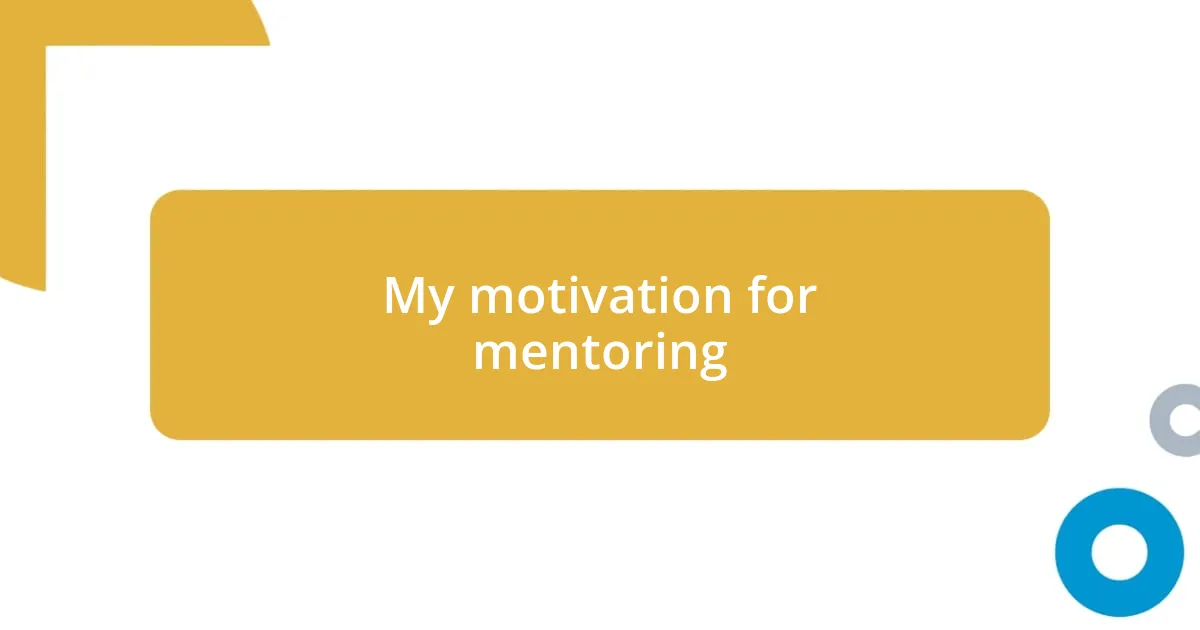
My motivation for mentoring
My motivation to mentor stems from a deep desire to make a positive difference in someone’s life. I vividly recall a moment with a mentee struggling to find her passion. When she finally discovered her love for art, the joy on her face lit up the room. It reminded me of how transformative it can be when someone feels supported and encouraged to pursue their dreams. That moment fueled my passion for mentoring even more.
- Witnessing growth is incredibly rewarding.
- The chance to share not just knowledge, but life lessons.
- Creating a safe space for open dialogue.
- Reliving the excitement of exploration through a young person’s eyes.
- The invaluable connections formed in mentorship.
Every time I share my experiences and insights, I feel a sense of purpose and fulfillment. It’s like I’m reliving my youthful ambitions while helping my mentees carve out their pathways. Seeing them overcome obstacles brings me immense satisfaction. I genuinely believe that every person, no matter how young, deserves a supportive figure to guide them through challenges.
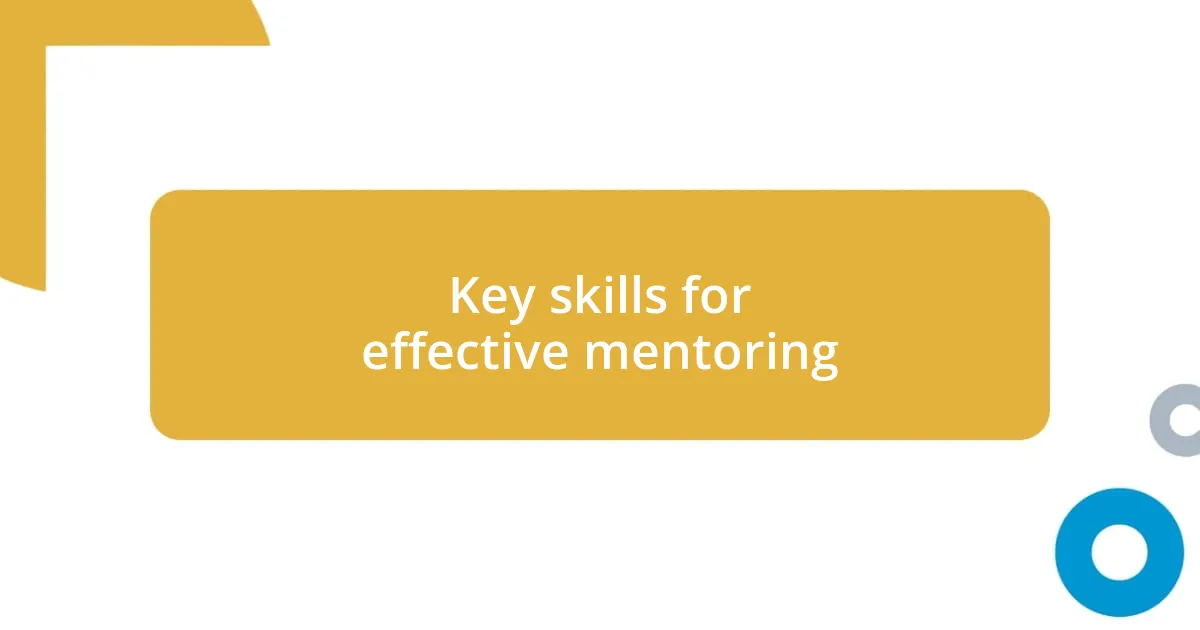
Key skills for effective mentoring
Effective mentoring requires a variety of key skills, but I find that active listening often stands out as one of the most crucial. I remember a mentee who felt unheard at school. By creating a space where they could share their thoughts freely, I was able to guide them toward self-reflection. This simple act allowed them to express their feelings and ultimately tackle their challenges head-on.
Another vital skill is empathy. Early in my mentoring journey, I had a mentee struggling with family issues. I made it a point to relate to their feelings, helping them feel that their experiences were valid and shared. When they realized they weren’t alone, it fostered a deeper trust in our relationship. Have you ever experienced the power of understanding someone else’s pain? It’s this connection that gives mentorship its strength.
Lastly, adaptability plays a significant role in being an effective mentor. Every mentee is unique, and their needs can change over time. I’ve had to adjust my approach numerous times—whether it was switching from structured discussions to more casual conversations when a mentee seemed overwhelmed. This flexibility can make all the difference in providing the support that truly resonates and facilitates growth.
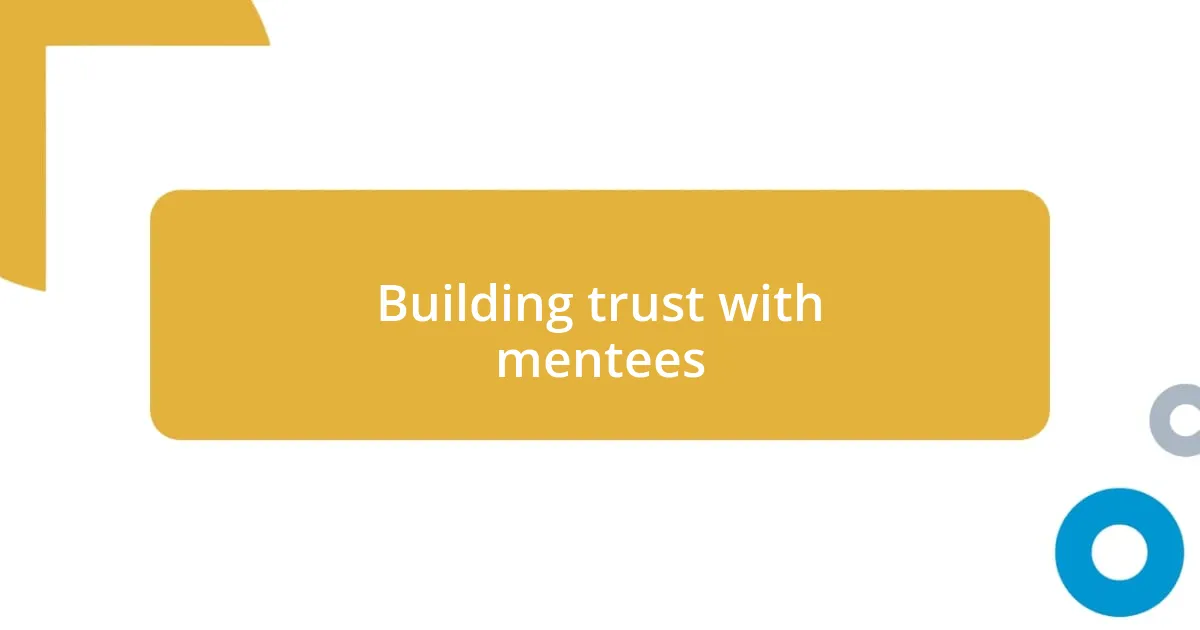
Building trust with mentees
Building trust with mentees is essential for fostering a productive relationship. I remember when a new mentee, hesitant and guarded, shared their fear of failing in school. I listened intently and validated their feelings, which immediately opened the door for deeper conversations. It’s fascinating how simply offering a listening ear can help someone feel seen and heard, don’t you think?
In another instance, I made an effort to be transparent about my own struggles as a young adult. I shared a story about my first attempt at starting a business and how it fell flat. This not only humanized me but allowed my mentee to see that setbacks are part of growth. When you share vulnerable moments, it creates a powerful bond of trust—one that shows your mentees they’re not alone in their journey.
I also find that consistency plays a crucial role in building trust. When I commit to regular meetings, it shows my mentees that I genuinely care about their development. It’s in those moments of reliability that they gradually open up, sharing their dreams and fears more freely. How have you established trust in your relationships? I’ve learned that being present consistently can turn a simple interaction into a safe space for growth and exploration.
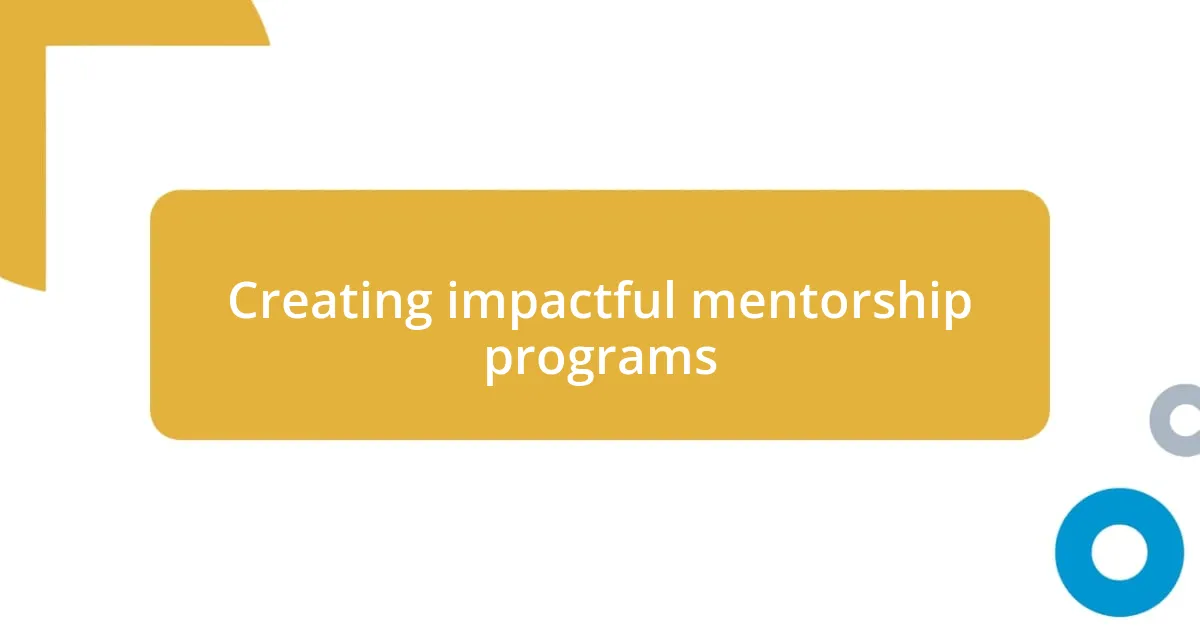
Creating impactful mentorship programs
Creating impactful mentorship programs begins with aligning the goals of both mentors and mentees. I recall launching a program that first involved identifying what each participant wanted to achieve. By ensuring everyone had a voice, we cultivated a sense of ownership. Have you ever felt more motivated when you had a say in your own path? It’s a subtle but powerful shift.
Moreover, program structure matters significantly. I once participated in a mentoring initiative that included a mix of one-on-one sessions and group workshops. This dual approach allowed for both personal attention and shared learning experiences. When mentees interacted with their peers, they discovered that their challenges were often universal. Seeing them light up with understanding was truly rewarding.
Lastly, feedback loops are essential in successful mentorship programs. After each session, I would ask my mentees what worked for them and what didn’t. This process not only made me a better mentor, but it also empowered them to take charge of their learning experiences. How often do you reflect on your own growth? Engaging in open dialogue about progress can significantly enhance the mentorship experience for everyone involved.

Measuring success in mentorship
Measuring success in mentorship can sometimes feel elusive, but I’ve found that one key indicator is the growth in my mentees’ confidence. There’s nothing quite as rewarding as witnessing a hesitant young person transform into someone who speaks up in group discussions or takes initiative in their projects. It makes me reflect—how do we quantify that shift? Yes, the changes might not show up on a chart, but their smiles and eagerness to share their achievements tell me all I need to know.
Another aspect is the feedback I receive. I remember a mentee who, after several months, told me that our sessions were the highlight of their week. They described feeling a sense of belonging and support. That emotional connection, to me, is a tangible measure of success. Have you ever experienced a relationship that just clicks? The ability to foster such a connection is where I believe the true impact of mentorship lies.
Ultimately, I’ve learned that success is not a one-size-fits-all solution. It could be the small victories—the first time a mentee applies for a scholarship or even the moment they share a personal story with me. These milestones may seem minor, but they’re powerful indicators of progress. Isn’t it fascinating how mentorship can interweave with personal growth in such meaningful ways? I like to think that success in mentorship is about navigating these moments together, celebrating every step along the way.














